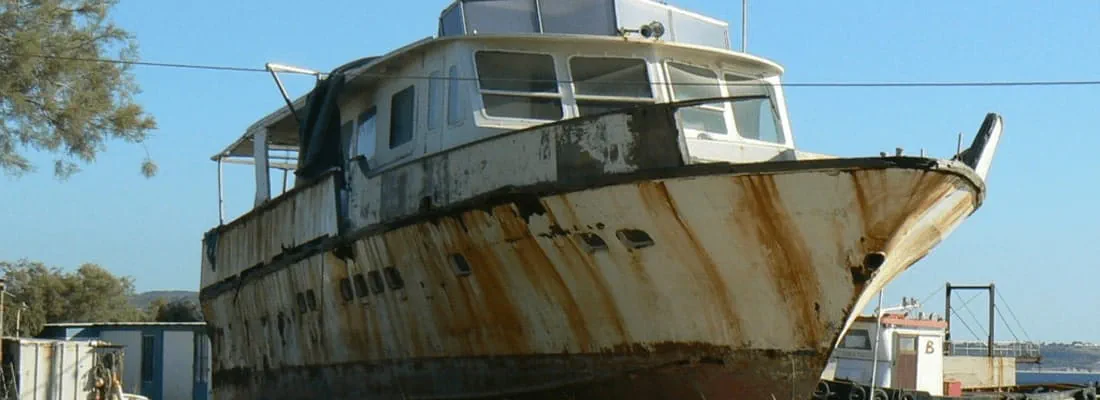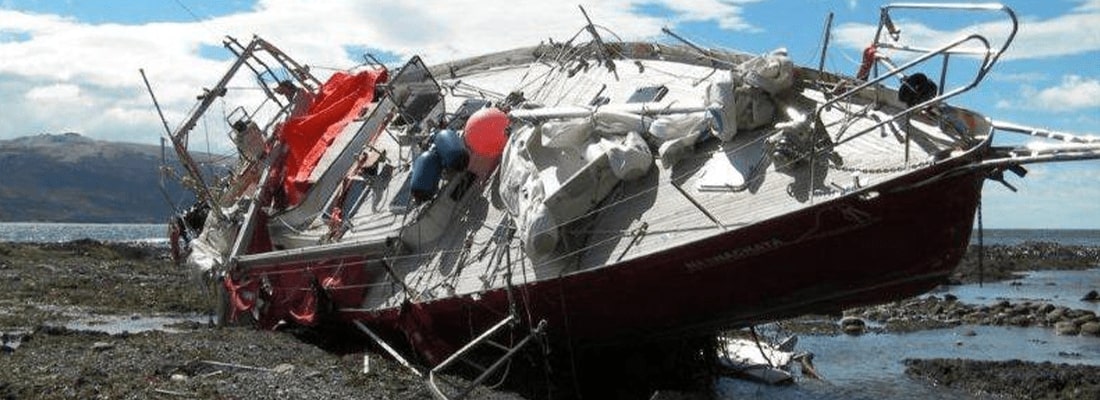The production and worldwide consumption of engineered composite materials, in particular fiber-reinforced polymers (FRP), have increased in recent decades, mainly in the automotive, aeronautical and nautical sectors. This increase in production and consumption has also led to an increasing amount of FRP waste, both End of Life (EoL) products and manufacturing waste.
Taking into account the current and future EU legislative framework on waste management, where targets are set with concrete measures to ensure implementation, landfills and incinerators will be phased out for this type of waste.Recycling techniques and end-use applications for recycled products have been studied over the past twenty years, but nevertheless, more affordable market for recycled products that can satisfy both economically and environmentally should be identified.
(G)FRP's
GFRP's are by far the largest group of materials used in marine construction, according to many market studies, the global glass fiber market should grow steadily in the future. Since GFRP-based products generally have a long life (20-25 years), disposal at the end of life was not a major concern until a few years ago. However, the amount of this type EoL GFRP waste will increase sharply in the coming years and this has become a particularly worrying problem. FRP thermoplastics can be easily recycled by melting and re-use, while the recyclability of thermosetting FRP products recovering the fibres is much more difficult due to the cross-linked nature of the resin matrix.
Therefore, in the near future, due to more restrictive EU directives, FRP producers and suppliers could lose their market share to the benefit of metals and other sectors if they cannot guarantee that their FRP components can be reused or recycled at the end of their life cycle. In fact, currently, although FRP composites are increasingly important in many industrial sectors, they are perceived as polluting and not recyclable, and particularly in the nautical sector, aluminum is perceived as "clean" and "ecological", this can be an obstacle crucial to the development or even continuous use of these materials.
How to prepare for the future?
It’s time! More than half a century after the start of mass-production of GFRP and later CFRP (Carbon Fiber Reinforced Plastic) hulls, the problem of disposal and recycling of the materials used is very pressing, also due to the ever-increasing public awareness on environmental issues. The need to reduce the environmental impact in marine production, especially of GFRP hulls (Glass Fiber Reinforced Plastic) has been a topical issue in recent years. The production systems have been revolutionized by the increasingly progressive and generalized use of the closed mold method i.e. infusion and the use of low-emission styrene resins.
However, much remains to be done to reuse or dispose of the boats and molds at the end of the cycle. The future of boating is not made so much by innovative forms, but revolves around some fundamental points for a correct growth of the sector: environmental compatibility in the different phases of construction, use and disposal of boats, the performance in function of the use and in relation to the economic and ecological aspects. It is some years that projects and researches aimed at creating regulations that help solve this problem in this productive sector are under way.
Recycling means being able to reuse every single part of a boat, this is the main problem in the marine industry. The key point of the whole process to arrive at a correct system of disposal and recycling of the new boats at their end of life cycle is in fact constituted by the knowledge of all materials components’ materials present on board and their composition and /or environmental hazards. This is not a novelty since in the automotive industry this system has been operating since a long time. End of lives’ cars are dismantled piece by piece, which can later be recycled or reused.
On dismantling
A boat is composed by many parts and many materials, not only composites but wood, steel, glass, fabrics, etc. etc. each material has different disposal methods, therefore, it is necessary that the boats are designed thinking that they must be completely dismantled piece by piece. To properly dismantle we must start from the skills of those who design and build. With the aim of proposing an industrial and sustainable model for the fiberglass recycling environment, which is still non-existent in Europe, several projects aimed at developing integrated platforms to manage the entire recycling process, making the best use of the technologies already developed, starting from robotics for disassembly and material selection, up to their chemical or physical treatment to obtain high added value fibers and resins.
In Europe some research is underway and there are proposals relating to the topic of FRP recycling, up to now without many results but the feeling towards environmental issues and the willingness to move from a linear economy to a circular one is certainly increased and manufacturers and consumers alike are increasingly turning to materials and products that are as environmentally friendly as possible.

U.K.
Recently, a marketing, communication and sustainability company fom the Isle of Wight in Great Britain, presented MarineShift360 a system for the evaluation of LCA, a method to understand what will be the environmental footprint of a product, in its whole life cycle. MarineShift360 is a tailor-made tool for the marine industry that provides an assessment of the life cycle of the materials and processes involved in yacht construction to understand the environmental impact of the products. the user will be able to plan with the concept of reducing the environmental impact already considering the end of life of the boat.
Even the America's Cup 2021 INEOS UK team has entered into a technical partnership with ELG Carbon Fiber, a supplier of recycled carbon fiber, to ensure sustainable materials and practices in its construction program.
UK/SPAIN
Another interesting project is presented by TYNC (The Young Naval Creators), a new naval architect design studio based in Valencia and London, that is developing the world’s first digitally connected eco powerboat. Leveraging the latest thinking from a young team of naval architects, combined with recent developments in sustainable materials and passion for digitally engaging physical products. They leveraged their combined experience in other industries such as yacht design, yacht construction, automotive industry, mobile tech and digital platforms, to create a powerboat that outsmarts and out eco-performs every model on the market.
The TYNC first eco-powerboat is made from recycled and sustainable materials with a composite which can separate this composite after its lifespan due to a smart resin. The fibers used have properties close to carbon fiber and stronger than glass fibers. The cores used in the composite is a mix of 100% bio and 100% recycled materials. With this in mind it is absolutely possible that in 10-15 years boats can be fully functional and sustainable. The team affirms that: “We can actually make the promise that the first design "TYNC 10" (10 meters long) will be built to last and can be recycled after it's lifespan”.
ITALY
Over the years, a number of recycling technologies have been proposed and developed that essentially fall into two categories: mechanical aimed at reducing the size of waste and those based on heat treatment processes. On the other hand, the awareness of poor recyclability is gaining considerable importance and is becoming a key factor as a limit to development or even to the continuous use of composite materials in certain sectors, particularly the marine. Back in 2004, both for economic interests and under the pressure of European directives in the environment, composites materials producers have expressed interest in waste management and end-of-life projects.
Dismantling, disposal and recycling of fiberglass
With the aim of proposing an industrial and sustainable model for the fiberglass recycling environment, still non-existent in Europe, the REVYTA project was launched last year, which aims at development - in about two years of operations and with an investment cost of 1.5 million euros - an integrated platform to manage the entire recycling process, making the best use of the technologies already developed, starting from robotics for disassembly and material selection, up to their treatment with a patent chemical experimentation to obtain high added value fibers and resins.
Furthermore, a recent survey on "Employment and service needs in the marine sector", carried out by DEMOPOLIS, in collaboration with other partners, interviewed managers of companies operating in the marine sector in Tuscany, Liguria , Sardinia, Corsica and the French Riviera, to identify the needs for services, skills and new employment. 38% of operators in the marine sector said they were optimistic about the growth of the industry over the next three years. For the 67% of companies, attention to the environment represents an opportunity for company growth.
Over a third imagine increase of employment for experts in eco-sustainability and circular economy. The boat industry believes in a future of innovation. Almost 4 out of 10 companies look to the next three-year period with full optimism, while just 10% expect a weakening of the sector. Employment opportunities are foreseen for emergency experts for boats, environmental monitoring and management systems (36%), but also for designers of new marine technologies (35%) and energy re-design experts (34%). Also experts in quality management of eco-sustainable processes and products (36%), but also in the enhancement and recycling of materials (34%), as well as specialists in territorial policies for sustainable development (33%).
Images courtesy of: Sergio Abrami, Davide Zerbinati

